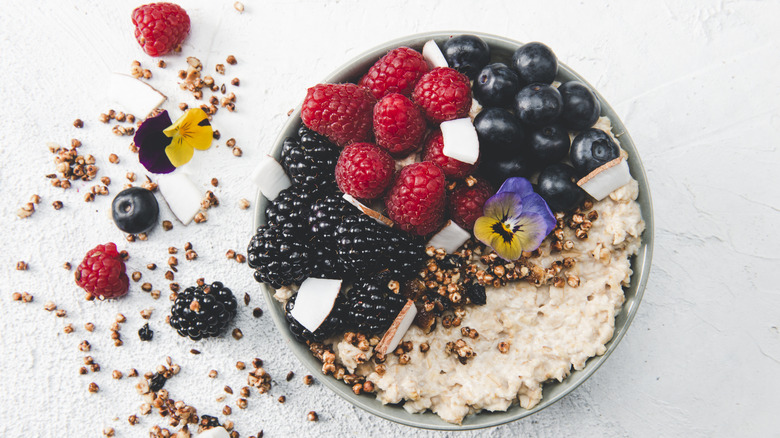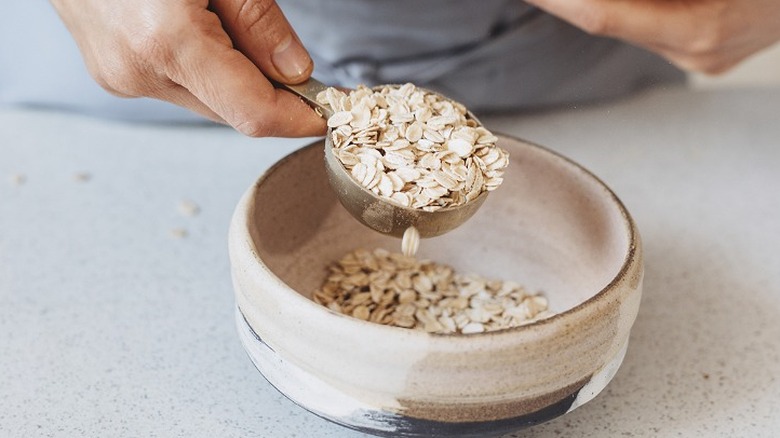Here's What Happens When You Eat Oatmeal Everyday
Beginning as a staple feed for horses and livestock, oatmeal has slowly made its way from the stables to our kitchen tables over the course of thousands of years. Boiled with milk or water, oatmeal began as a simple dish but has now evolved into a hearty breakfast enjoyed in various forms. This grain has become a significant part of our lives, from crispy cookies to soaked overnight oats, and is even offered as a healthy Burger King breakfast option.
It's comforting, filling, and delicious. Yet eating one dish every day might arouse feelings of guilt — or at least boredom. While there are plenty of ways to make oatmeal, is it healthy to consume it on a regular basis? You'll be pleased to know that digesting oatmeal every day will not have you sprouting shoots or galloping around a field. It's highly nutritious and has wonderful lasting effects on our bodies. You can throw out the worries of nutritional deficiencies or stalled weight loss; it's time to see exactly what all the fuss is about.
What makes oatmeal so special?
Oatmeal in all its forms is highly nutritional, which is crucial to understanding why we can eat it daily. Unlike other cereals, oats have a unique nutritional composition. Their high content of fiber includes β-glucan, which is proven to lower cholesterol and improve glucose levels, preventing diabetes and coronary heart disease. Not only this, but oatmeal is a prebiotic food, which means it encourages good bacteria to thrive inside our guts. Elevating your emotional well-being and digestive function!
They are also rich in zinc (which is great for our skin), silicon (which is great for our bones), magnesium, iron, and thiamin (which is great for cell growth). Our little oats can provide a healthy daily meal with these fibers, minerals, and nutrients. We can understand how you may still be skeptical. Too much of a good thing can be detrimental, right? Well, research has shown that eating oatmeal daily can lower our body mass, boost our immune system, and improve overall energy levels throughout the day. Even if your oats are expired, as long as they have retained their flavor and texture, they are safe to eat. So what's your excuse?
Step into the oatmeal-verse
As mentioned earlier, one of the most incredible things about oatmeal is its versatility. Overnight oats are a popular breakfast option that requires minimum prep the night before. For instance, try mixing peanut butter and jelly into your overnight oats for a nostalgic flavor and protein boost. You can also make nutrient-boosting oatmeal muffins or cookies. Now that you know their benefits, consuming oatmeal treats will undoubtedly make you feel less guilty.
It's most common to make oatmeal sweet by adding fruit, honey, or other sugary ingredients, but there are plenty of ways to make it savory if you have a salt tooth. You can transform your sweeter breakfast bowl into something different with eggs, beans, roasted veggies, avocado, or cheese. You could even try making oat upma, a South Indian breakfast staple almost akin in texture to fried rice. You just need to dry roast oats until they are crisp and crunchy; you can then add these to herbs, spices, and small diced vegetables (carrots, beans, or peas). As long as you combine daily oatmeal with diverse ingredients, you can achieve a balanced diet, which will lead to a healthier lifestyle.


